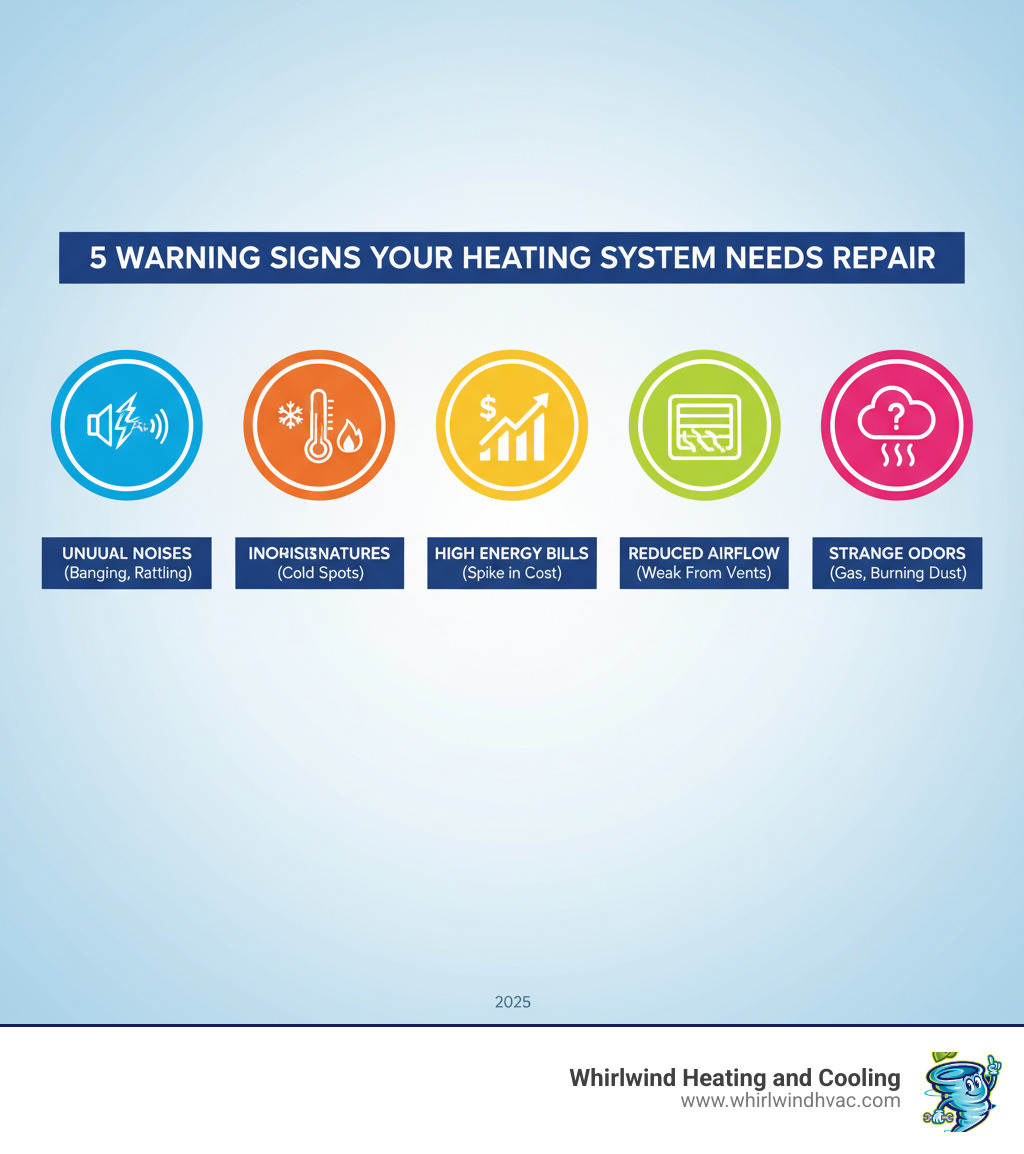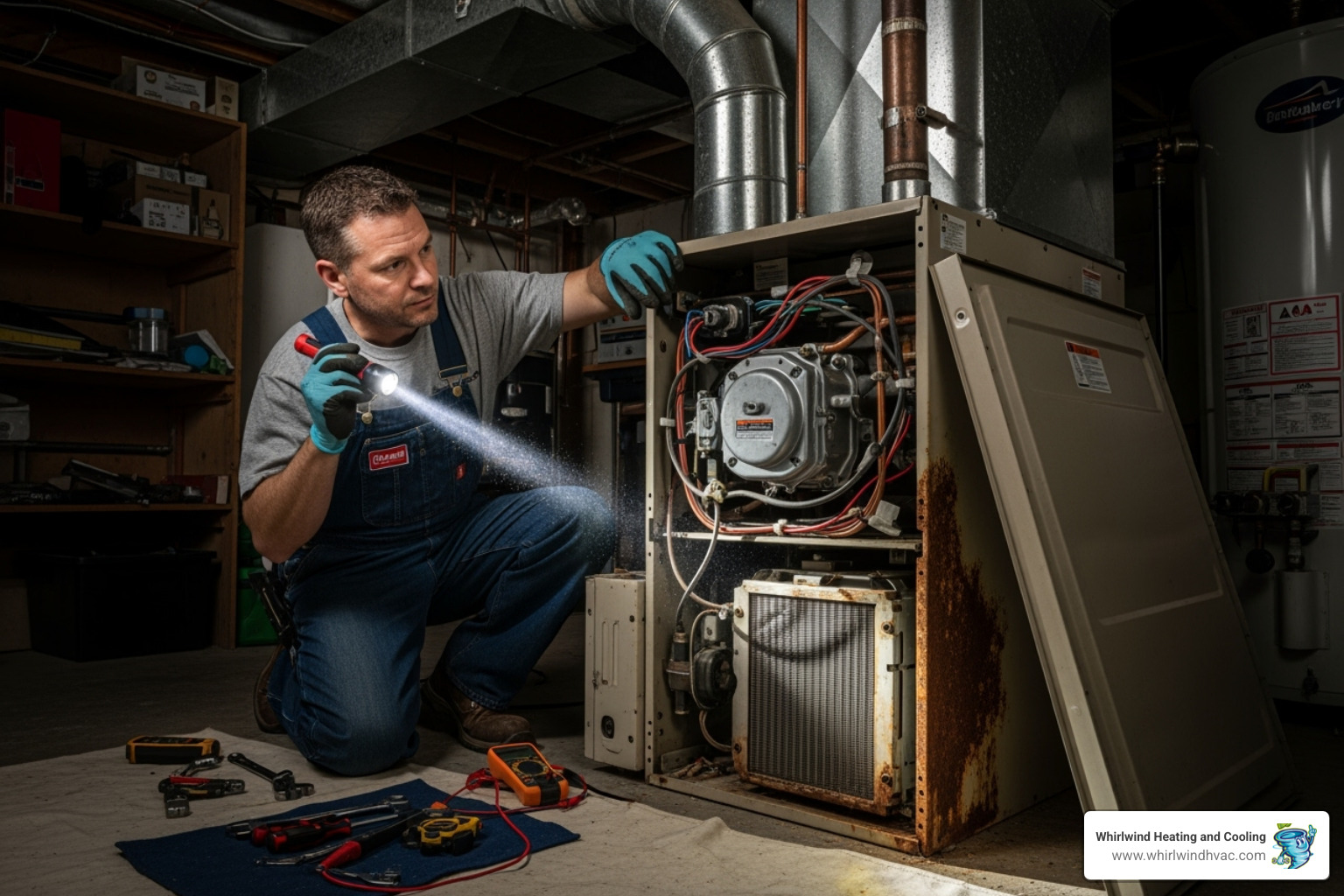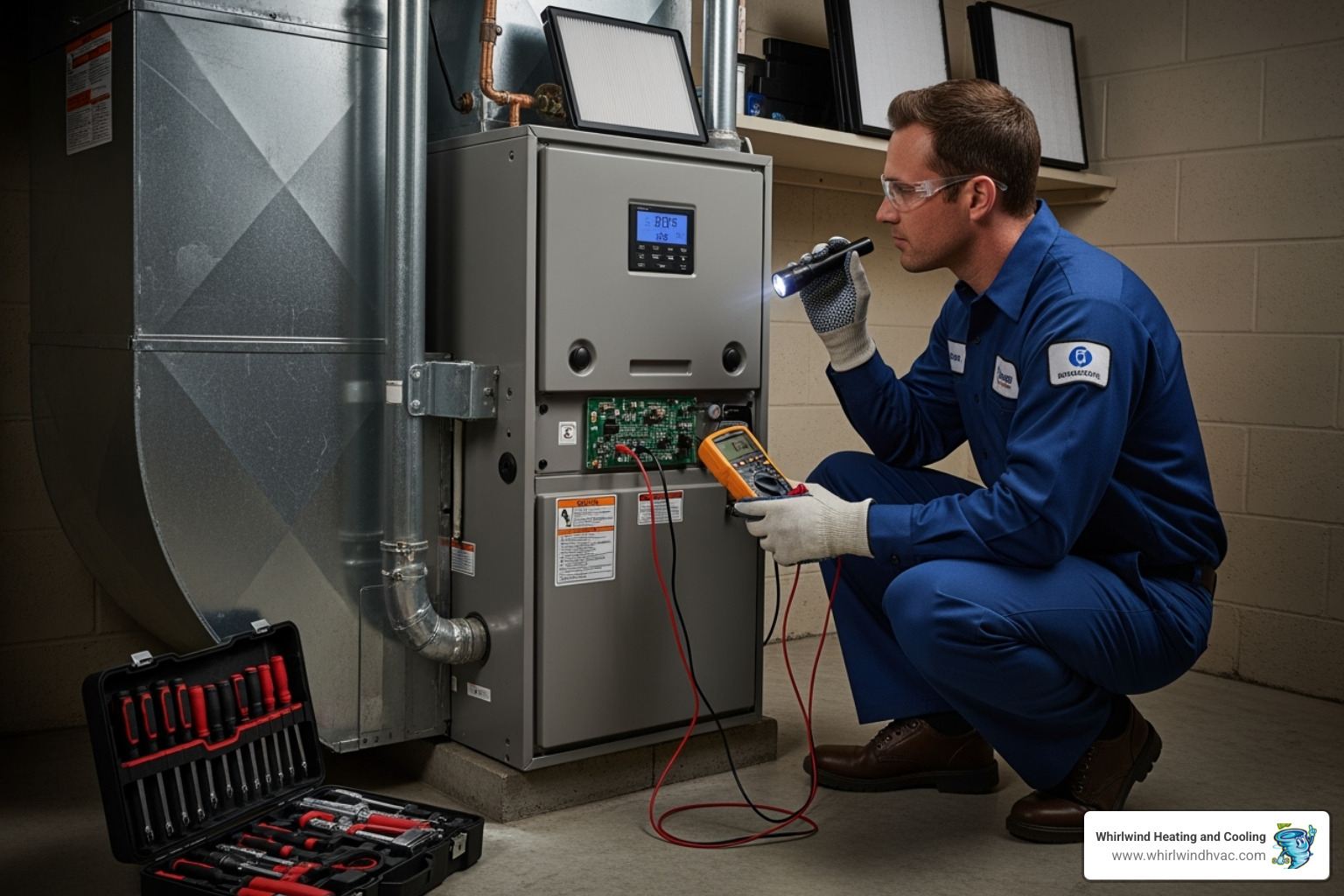Why Understanding Heating System Repair Matters for Your Home
When your heating system repair needs arise, knowing what to expect can save you time, money, and stress. A malfunctioning heating system doesn’t just mean discomfort – it can lead to safety hazards, sky-high energy bills, and costly emergency repairs.
Quick Signs You Need Heating System Repair:
- Strange noises – banging, rattling, or screeching sounds
- Inconsistent heating – cold spots or uneven temperatures
- Higher energy bills – sudden spikes without increased usage
- Reduced airflow – weak air coming from vents
- Foul odors – gas smells or burning dust scents
- Frequent cycling – system turning on and off constantly
Most heating system repairs cost between $100-$200 for minor issues like thermostat problems, while major repairs can range from $500-$1,500.
Your heating system works hard to keep your Willamette Valley home comfortable during those chilly Oregon winters. When it starts showing signs of trouble, quick action prevents small problems from becoming major headaches.
This guide covers everything you need to know about heating system repair – from spotting early warning signs to choosing the right professional for the job. You’ll learn when to repair versus replace, how maintenance saves money, and what constitutes a true heating emergency.
Telltale Signs: Is Your Heating System Crying for Help?
Imagine your furnace at your Woodburn home suddenly making a loud noise, or your living room feeling like an icebox despite a high thermostat setting. These aren’t just quirks—they’re your heating system’s way of waving a red flag.
Recognizing these warning signs early can save you from a midnight heating system repair emergency when your furnace fails in freezing weather.
Strange Noises
Your heating system should be quiet. If it starts making unusual sounds, pay attention.
- Banging noises often mean trouble with ignition—grime and soot can cause small explosions instead of a smooth startup.
- Rattling usually points to loose parts or debris.
- Screeching sounds typically signal worn blower motor bearings, which can lead to complete motor failure if ignored.
Inconsistent Heating
It’s frustrating when one room is a sauna and another is an icebox. This means your heating system isn’t working properly.
Cold spots throughout your home usually indicate problems with airflow or heat distribution. This could be anything from clogged air filters to leaky ductwork or a struggling blower fan. Check out our guide on Fixing Uneven Heat Distribution Problems for more detailed solutions.
Reduced airflow from your vents is another telltale sign. If you hold your hand over a vent and barely feel a whisper of air, your system is working overtime but not delivering results. The most common culprit? A dirty air filter that’s choking your system.
Foul Odors
A brief burning dust smell at the start of the season is normal. Any other odors require immediate attention.
A gas smell that reminds you of rotten eggs is a serious emergency—this could indicate a natural gas leak. Burning dust smells are normal at first startup, but if they persist, you might have excessive buildup or electrical issues. A sharp, acrid burning smell often signals overheating wires or failing motors, which can pose fire hazards.
These odors don’t just affect comfort—they can impact your indoor air quality and pose real safety risks. For a complete rundown of warning signs, check out Signs You Need Heater Repair.
Your Utility Bill is Spiking
If your heating habits haven’t changed but your utility bill has spiked, your system likely needs attention. Unexpectedly high energy bills are a clear warning sign.
When your system isn’t running efficiently, it has to work harder and longer to heat your home. This extra effort translates directly into higher energy costs. Whether it’s a clogged filter, faulty thermostat, or an aging system, these problems drain your wallet.
Addressing heating system repair issues promptly can significantly reduce your energy consumption. Learn more about the Indicators for Timely Furnace Repair to catch problems before they become expensive.
The System is Constantly Cycling
Does your heating system turn on and off frequently? This short cycling behavior means it starts but never completes a full heating cycle.
Frequent on-and-off cycling is inefficient and puts unnecessary stress on your system’s components, wearing them out faster.
Thermostat issues can cause this problem when the thermostat incorrectly signals the system to start and stop. Overheating signs are another common cause—a clogged air filter can restrict airflow so much that your heat exchanger gets too hot and shuts down as a safety measure.
If you have a ductless system experiencing this issue, our article on why a Ductless Heater Starts Cycling On and Off can help you understand what’s happening.
Constant cycling indicates an underlying problem that needs professional diagnosis. Your system should run in steady, predictable cycles.
Common Problems and Professional Heating System Repair
When your heating system fails in a Willamette Valley winter, it’s likely one of several common issues. Understanding the problem helps you know when to call for heating system repair and what to tell the technician.
Our team services the main heating systems in Woodburn, Salem, and surrounding areas: Furnaces (heating air with gas, oil, or electricity), Boilers (heating water for radiators), and Heat pumps (moving heat for cooling and heating). For flexible solutions, a Ductless Heater Perfect for Residential Homes offers excellent efficiency.
The most common problem is a clogged air filter. A dirty filter forces your system to work harder, leading to high energy bills, reduced comfort, and potential damage.
Thermostat malfunctions are another frequent issue. As the system’s brain, a faulty thermostat can cause constant cycling, incorrect temperatures, or failure to turn on.
For gas furnaces, pilot light and ignition problems can leave you in the cold. A dirty flame sensor is often the culprit, shutting off gas flow as a safety measure. Our guide on Pilot Light Issues in Woodburn Furnace explains why this requires professional handling.
A cracked heat exchanger is one of the most serious furnace problems, as it can leak carbon monoxide into your home. Signs include strange odors or a flickering yellow flame. If you suspect this, evacuate and call for emergency service immediately.
Blower motor failure means heat is produced but not distributed, leaving your rooms cold. You’ll notice weak or no airflow from vents. Electrical problems, from tripped breakers to faulty wiring, can also prevent your system from starting. Our insights on Common HVAC Electrical Problems highlight why professional diagnosis is essential.
The Benefits of Professional Heating System Repair
While DIY repair seems tempting, heating system repair involves complex diagnostics and serious safety risks with gas lines and electrical components. The stakes are too high for a trial-and-error approach.
- Safety: Professionals handle gas leaks and electrical hazards safely. Our certified technicians follow strict protocols to protect your family.
- Accurate Diagnosis: Modern systems are complex. Our technicians use specialized tools and experience to find the root cause, not just treat symptoms.
- Guaranteed Parts & Tools: We use specialized tools and carry guaranteed parts designed for your system to ensure a reliable, long-lasting repair.
- Long-Term Solutions: Professional repair provides long-term solutions, not temporary patches. We stand behind our work, extending your system’s lifespan and giving you confidence the problem is solved.
Professional repair restores your system’s efficiency, lowering energy bills. For more guidance, check our Signs You Need Professional HVAC Repair guide.
The Proactive Approach: Maintenance, Savings, and When to Replace
Think of your heating system like a trusted friend who’s been keeping your family warm through countless Oregon winters. Just like any good relationship, it needs regular attention to stay healthy and reliable. The difference between a heating system that serves you faithfully for decades and one that leaves you shivering during the coldest snap often comes down to one simple thing: proactive maintenance.
We can’t tell you how many emergency heating system repair calls we receive that could have been prevented with simple annual maintenance. Picture this: it’s the first truly cold night of the year in Woodburn, and your furnace decides to take an unscheduled vacation. What often feels like sudden system failure is usually the result of small issues that have been building up over months or even years.
Annual inspections are your heating system’s best friend. We recommend scheduling your tune-up before winter arrives in the Willamette Valley, ideally in early fall. During these visits, our technicians become heating system detectives, spotting the tiny problems that could become big headaches later. That loose belt that’s starting to fray? We’ll catch it before it snaps. The gas connection that’s developed a minor leak? We’ll fix it before it becomes dangerous.
This proactive approach doesn’t just prevent those dreaded midnight breakdowns when it’s 20 degrees outside. It ensures your system operates at peak performance all season long, delivering consistent warmth without the strain that leads to premature wear. When your heating system isn’t fighting against clogged filters, dirty components, or minor mechanical issues, it can focus on what it does best: keeping your family comfortable.
Most importantly, regular maintenance keeps your family safe. Our comprehensive inspections include checking for gas leaks, testing for carbon monoxide emissions, and ensuring all electrical connections are secure. For homeowners in our area, Heating Maintenance Woodburn OR isn’t just about comfort—it’s about peace of mind.
How a Well-Maintained System Saves You Money
Here’s something that might surprise you: the money you spend on annual maintenance often pays for itself within the first year through energy savings alone. A well-tuned heating system is remarkably more efficient than one that’s been neglected.
When your system is clean and properly adjusted, it doesn’t have to work nearly as hard to heat your home. Improved energy efficiency means your furnace or heat pump can reach your desired temperature faster and maintain it with less effort. This translates directly into lower heating costs on your monthly utility bills.
Consider what happens when your air filter gets clogged (something we check and replace during maintenance visits). Your system has to work overtime to push air through that dirty filter, consuming significantly more energy in the process. Multiply this effect across multiple components—dirty coils, worn belts, improperly calibrated thermostats—and you can see how neglect literally costs you money every month.
Beyond the monthly savings, maintenance extends your system’s lifespan considerably. A heating system that receives regular care can easily last 18-20 years, while a neglected system might need replacement after just 10-12 years. That’s nearly a decade of additional service from the same initial investment.
Smart homeowners also look beyond basic maintenance to maximize their savings. Programmable thermostats allow you to automatically lower temperatures when you’re sleeping or away from home, reducing energy consumption without sacrificing comfort. Sealing ductwork prevents heated air from escaping into crawl spaces or attics, ensuring every bit of warmth you’re paying for actually reaches your living spaces.
For practical ways to keep your system running efficiently between professional visits, our guide on 7 Tips to Maintain Heating System offers valuable insights you can implement today.
Repair vs. Replace: Making the Call
Eventually, every homeowner faces this tough decision: is it worth investing in another heating system repair, or is it time to replace the entire system? It’s one of those moments where the immediate cost of repair battles against the long-term value of replacement, and the right choice isn’t always obvious.
| Feature | Repair | Replace |
|---|---|---|
| Age of System | Generally for systems under 10-12 years old | Systems 15-20 years old or older |
| Lifespan | Extends current system’s life for a period | Provides a new system with a full 15-20 year life |
| Frequency of Repairs | For occasional, isolated issues | When repairs become frequent and costly |
| Cost of Repair | Minor issues ($100-$200), complex ($500-$1,500) | Significant upfront investment |
| 50% Rule | If repair cost is less than 50% of replacement | If repair cost exceeds 50% of replacement value |
| Energy Efficiency | Restores current efficiency | Significantly improved efficiency with new models |
Age matters more than you might think. Most heating systems have a lifespan of 15-20 years when properly maintained. If your system is approaching or has passed this age range, replacement often makes more financial sense than continued repairs. Think of it like an aging car—at some point, you’re throwing good money after bad.
The frequency of repairs tells an important story too. If you’re calling us every season for different issues, your system is likely trying to tell you something. When repairs become a regular occurrence rather than an occasional necessity, it’s usually time to start shopping for a replacement.
We often recommend the “50% rule” to help homeowners make this decision. If a single repair costs more than 50% of what a new system would cost, replacement typically makes more sense. For example, if your old furnace needs a $2,000 repair but a new system costs $4,500, that repair is eating up nearly half the cost of going new.
Energy efficiency considerations can tip the scales toward replacement even for systems that aren’t quite at end-of-life. Modern heating systems are dramatically more efficient than models from even 10-15 years ago. The monthly savings on your energy bills from a new, high-efficiency system can often offset the purchase price over just a few years.
This decision doesn’t have to be made alone. Our experienced technicians provide honest assessments of your system’s condition, helping you weigh all factors without any pressure. We’ve seen too many homeowners struggle with systems that should have been replaced years ago, and we’ve also seen others rush into unnecessary replacements when a simple repair would have provided years more service.
For deeper insights into making this important decision, explore our comprehensive guide on When to Consider Furnace Replacement. And when you’re ready to explore replacement options, our Furnace Replacement Woodburn OR services ensure you get the right system for your home and budget.
Choosing a Provider and Handling Emergencies
When your heating system breaks down during a cold Oregon winter, you need more than just a quick fix – you need a trusted partner who can restore warmth and safety to your home. Having a reliable company for heating system repair in the Willamette Valley isn’t just convenient; it’s essential for your family’s comfort and peace of mind. That’s where Heating Repair Woodburn OR services become invaluable.
But sometimes, heating problems go beyond routine repairs and become genuine emergencies that require immediate attention.
What is a Heating Emergency and What Should You Do?
Not every heating hiccup requires an emergency call, but certain situations absolutely demand urgent action. Recognizing these critical moments can protect your family from serious danger.
No heat during freezing weather tops the list of heating emergencies. When temperatures drop to freezing or below and your system completely fails, you’re facing more than just discomfort – especially if you have elderly family members, young children, or health conditions that make cold exposure dangerous.
The smell of gas or rotten eggs around your heating system signals a potential natural gas leak, which is extremely hazardous. Natural gas companies add that distinctive rotten egg smell specifically so you’ll notice it immediately. This isn’t something to investigate yourself or hope will go away.
When your carbon monoxide detector alarm sounds, take it as seriously as a fire alarm. Carbon monoxide is an invisible, odorless killer that can leak from a cracked heat exchanger or other combustion problems. Your detector is your early warning system – don’t ignore it.
Loud mechanical noises followed by complete system shutdown often indicate catastrophic failure. While strange sounds usually just mean you need routine heating system repair, a sudden explosive bang, severe grinding, or metal-on-metal screeching that stops your system cold suggests something major has broken.
When facing a true heating emergency, follow these critical steps: First, evacuate immediately if you smell gas or hear a CO alarm – get everyone, including pets, out of the house without delay. Second, call 911 or your utility company from a safe location outside your home to report the emergency. Third, contact a 24/7 HVAC professional once emergency services have addressed any immediate safety threats.
What to Consider When Choosing a Heating System Repair Service
Choosing the right heating system repair company can make the difference between a quick, lasting fix and ongoing headaches. When your family’s comfort is on the line, you want professionals who combine expertise with integrity.
Licensed and insured should be non-negotiable requirements. These credentials protect you from liability and ensure the technicians meet industry safety standards. Always verify these before allowing anyone to work on your heating system.
Local experience matters more than you might think. A company rooted in the Willamette Valley understands the unique challenges of heating homes in Woodburn, Salem, Portland, and Silverton. We know how Oregon’s climate affects different heating systems and what problems commonly arise in our area.
Positive reviews and reputation tell the real story of how a company treats its customers. Look beyond just star ratings – read what people say about response times, work quality, and whether problems stayed fixed. Our commitment to responsive communication and quality service has earned us the trust of families throughout the region.
Transparent pricing means no surprise bills or hidden fees. A reputable company provides clear estimates upfront and explains exactly what work needs to be done. At Whirlwind Heating and Cooling, we believe in doing it right at a fair price – and that includes honest, straightforward pricing.
24/7 emergency availability becomes crucial when your heating system fails at 2 AM on the coldest night of the year. Heating emergencies don’t wait for business hours, so neither should your repair service.
Community involvement often reflects a company’s character and commitment to quality. When a business supports local organizations like Habitat for Humanity, it demonstrates the kind of integrity and community dedication that usually translates into better customer service.
Finally, look for comprehensive services that go beyond just repairs. A company that handles maintenance, installations, and various heating system types can be your long-term partner for all your heating needs. You can learn more about our full range of services at HVAC Company Woodburn OR.
The right heating system repair partner gives you confidence that your home will stay warm, safe, and comfortable no matter what challenges arise.
Conclusion
Your home’s heating system is more than just a machine tucked away in your basement or utility room – it’s the heart that keeps your family warm and safe through every Oregon winter. Understanding heating system repair empowers you to catch problems early, make smart decisions, and avoid those middle-of-the-night emergencies when the temperature drops.
Throughout this guide, we’ve walked through the warning signs your system gives you: those strange banging noises that sound like someone’s trapped in your ducts, the cold spots that turn your bedroom into an icebox, and the spiking utility bills that make you wonder if your furnace is secretly plotting against your budget. These aren’t just inconveniences – they’re your system’s way of asking for help.
We’ve explored the common culprits behind heating troubles, from clogged air filters (the number one enemy of efficiency) to more serious issues like cracked heat exchangers that can put your family at risk. Whether you have a trusty furnace, a reliable boiler, or an efficient heat pump, professional expertise makes all the difference between a quick fix and a costly catastrophe.
Regular maintenance truly is your best friend here. Think of it as an annual check-up for your heating system – catching small problems before they become big headaches, keeping your energy bills reasonable, and helping your system live its best, longest life. And when that tough decision comes between repair or replacement, remember the 50% rule and consider your system’s age. Sometimes saying goodbye to an old, faithful furnace is actually the kindest thing you can do for your wallet.
Emergencies happen, and knowing what constitutes a real crisis can protect your family. Gas smells, carbon monoxide alarms, and complete system failures in freezing weather aren’t times to wait until morning – they’re times to act quickly and call for help.
When choosing a service provider for your heating system repair needs, look for the qualities that matter: proper licensing, local experience, transparent pricing, and genuine community commitment. You want someone who understands Willamette Valley winters and treats your home with the same care they’d give their own.
Your heating system works hard to keep your family comfortable, safe, and cozy. By staying alert to warning signs, investing in regular maintenance, and partnering with trusted professionals, you’re ensuring that your home remains the warm sanctuary your family deserves.
For quality service and fair pricing on all heating services in Woodburn, OR, trust the team at Whirlwind Heating and Cooling. We’re your neighbors in the Willamette Valley, and we’re here to do it right, at a fair price, every single time.





